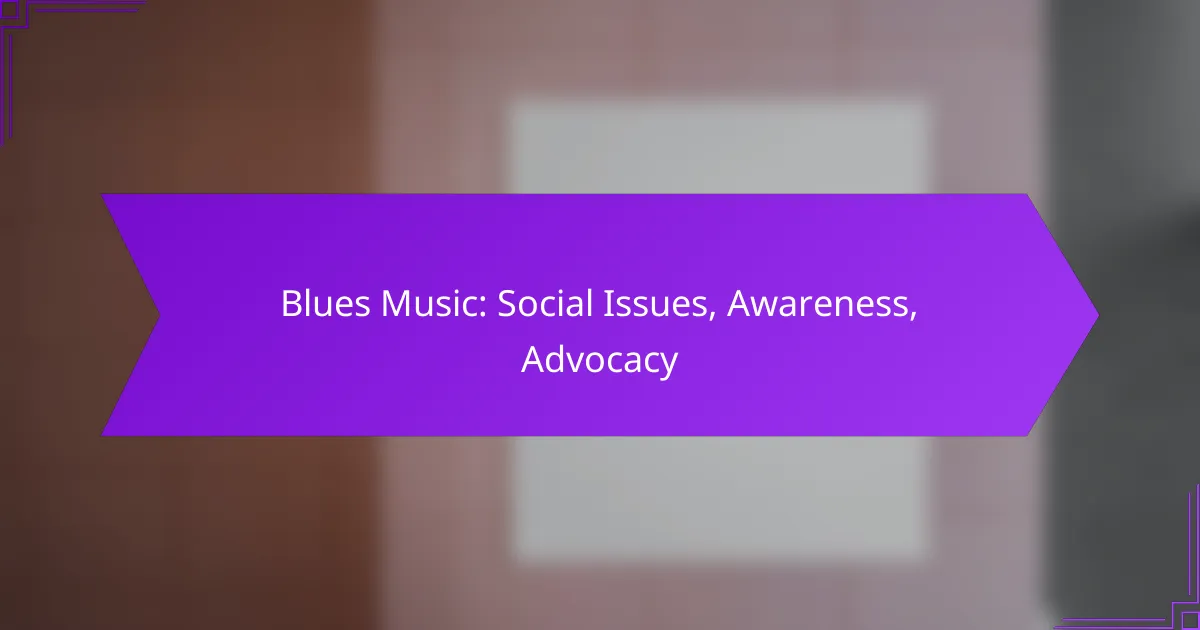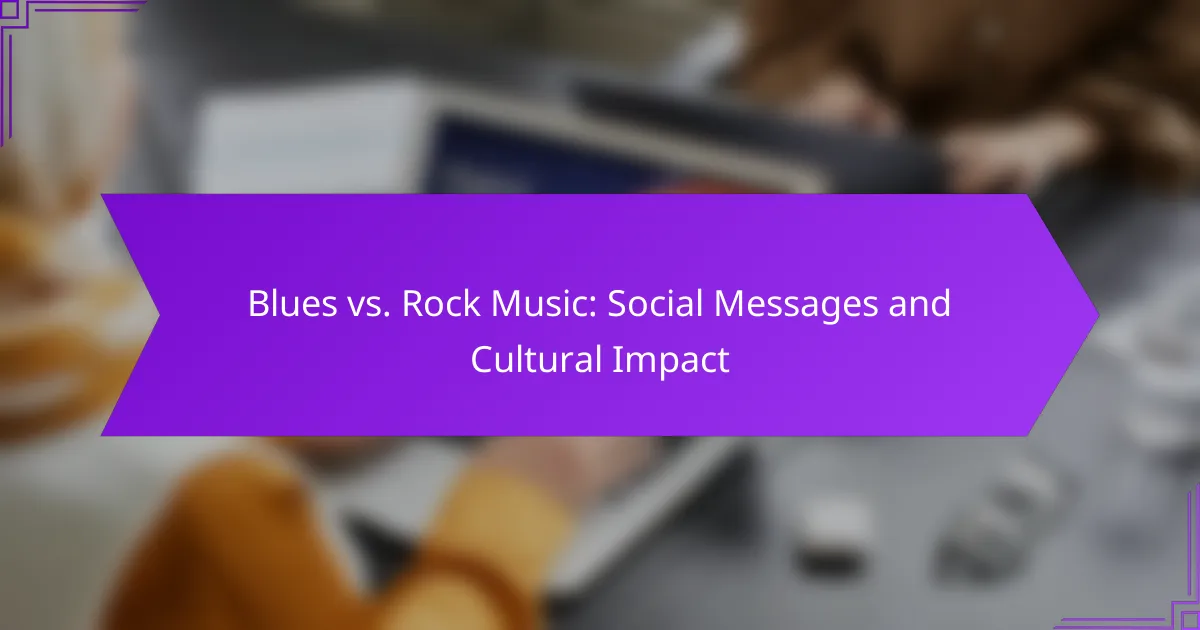Blues music serves as a poignant medium for raising awareness about social issues, articulating the struggles faced by marginalized communities through heartfelt storytelling. By addressing themes such as poverty, racism, and inequality, blues artists encourage listeners to engage with these critical topics and inspire collective action. Festivals dedicated to this genre further amplify these messages, promoting community engagement and advocacy for racial equality and economic justice.
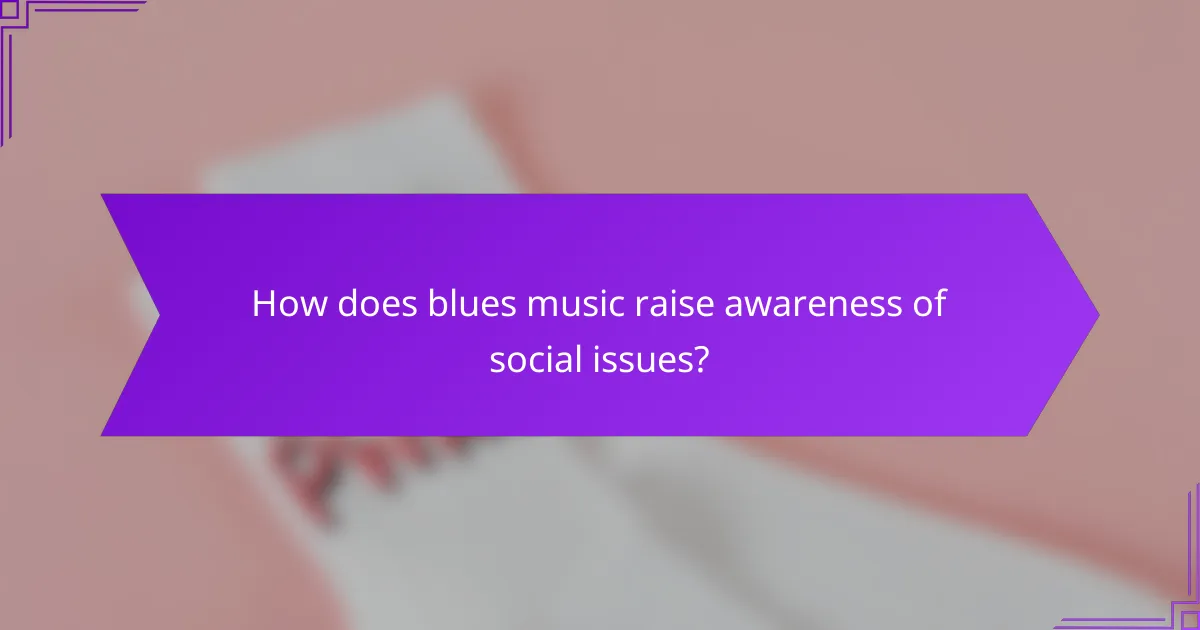
How does blues music raise awareness of social issues?
Blues music raises awareness of social issues by expressing the struggles and injustices faced by marginalized communities. Through storytelling and emotional depth, blues artists highlight themes such as poverty, racism, and inequality, prompting listeners to reflect on these critical topics.
Historical context of blues music
The origins of blues music date back to the late 19th and early 20th centuries in the Deep South of the United States, emerging from African American communities. It was born out of the experiences of enslaved people and their descendants, who used music as a form of expression and resistance against oppression. This historical backdrop is essential for understanding how blues music serves as a voice for social issues.
During the Great Migration, many African Americans moved to urban areas, bringing blues music with them. This transition allowed the genre to evolve and reach wider audiences, making it a powerful tool for social commentary on the struggles faced by these communities in a rapidly changing society.
Key artists advocating for social change
Several blues artists have used their platform to advocate for social change, becoming symbols of resistance and hope. Artists like B.B. King and Muddy Waters not only entertained but also addressed issues such as racial discrimination and economic hardship in their music. Their songs often served as a rallying cry for civil rights and social justice.
More contemporary figures, such as Keb’ Mo’ and Susan Tedeschi, continue this tradition by incorporating themes of social awareness into their work. They engage with audiences on issues like poverty, environmental justice, and systemic racism, ensuring that the blues remains relevant in today’s social landscape.
Impact of lyrics on social consciousness
The lyrics of blues songs often reflect the harsh realities of life, making them a powerful medium for raising social consciousness. By narrating personal and collective struggles, these songs resonate deeply with listeners, fostering empathy and understanding. For example, songs that discuss the pain of loss or the fight against injustice can inspire action and awareness among audiences.
Moreover, the raw emotion conveyed in blues lyrics can provoke thought and discussion about societal issues. This impact is amplified when artists perform live, creating a shared experience that encourages community dialogue around the themes presented in their music.
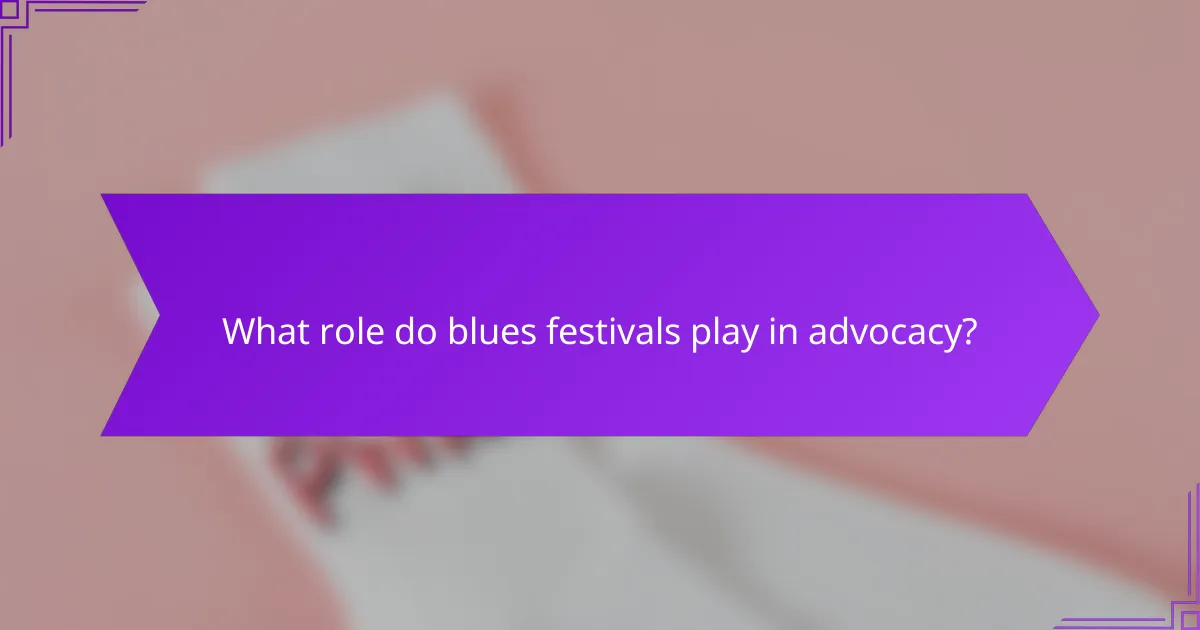
What role do blues festivals play in advocacy?
Blues festivals serve as powerful platforms for advocacy by raising awareness about social issues and promoting community engagement. They often highlight themes such as racial equality, economic justice, and cultural heritage, using music to inspire action and dialogue.
Major blues festivals in the United States
Some of the most notable blues festivals in the United States include the Chicago Blues Festival, the New Orleans Jazz & Heritage Festival, and the King Biscuit Blues Festival in Arkansas. These events attract thousands of attendees and feature performances from both established and emerging artists, creating a vibrant atmosphere for advocacy.
These festivals often incorporate workshops, discussions, and local community initiatives, allowing attendees to engage with social issues directly. For example, the New Orleans Jazz & Heritage Festival includes educational programs that focus on the cultural significance of blues music and its roots in African American history.
Community engagement through music
Blues festivals foster community engagement by bringing together diverse groups of people to celebrate music and culture. They create opportunities for local artists to showcase their talents while connecting with audiences who share a passion for the genre.
Many festivals also partner with local organizations to address pressing social issues. This collaboration can include fundraising for community projects or providing resources for education and advocacy. By integrating music with social causes, these events help to strengthen community ties and promote a shared sense of purpose.
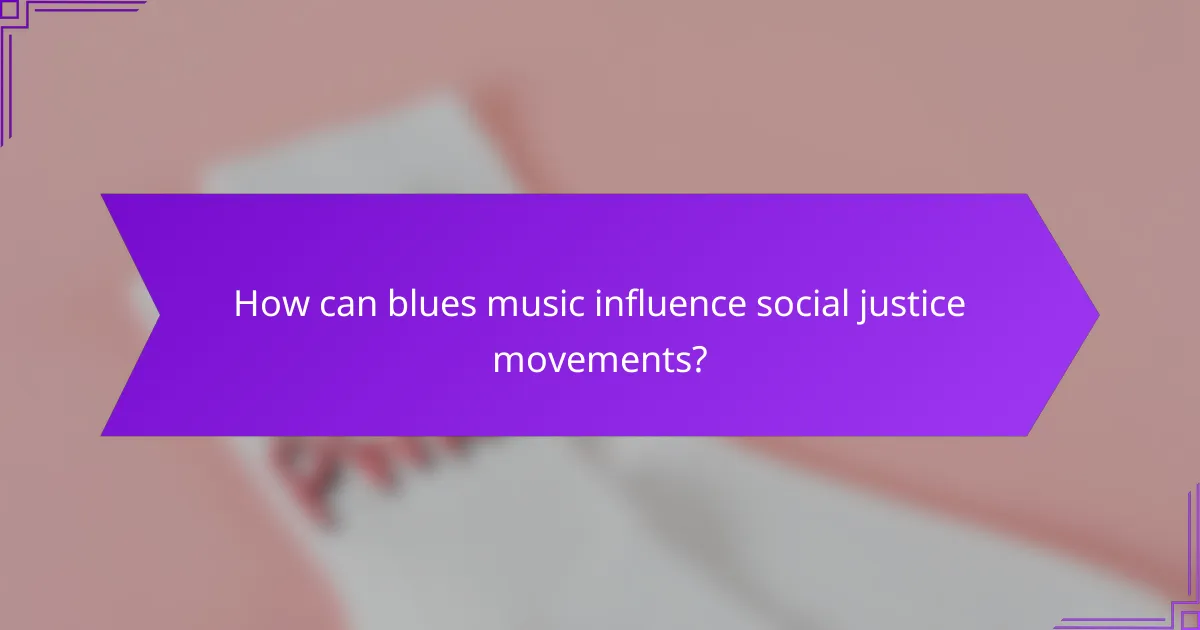
How can blues music influence social justice movements?
Blues music can significantly influence social justice movements by raising awareness of social issues and inspiring collective action. Through its powerful lyrics and emotional resonance, blues serves as a voice for marginalized communities, fostering solidarity and advocacy for change.
Collaborations with social justice organizations
Many blues artists partner with social justice organizations to amplify their messages and reach wider audiences. These collaborations often involve benefit concerts, fundraising events, and awareness campaigns that highlight specific social issues, such as racial inequality or economic injustice.
For instance, artists may perform at events organized by groups like the NAACP or Amnesty International, using their platform to draw attention to ongoing struggles and mobilize support. Such partnerships can enhance the impact of both the music and the advocacy efforts, creating a stronger collective voice.
Case studies of blues songs in activism
Several blues songs have played pivotal roles in social activism, illustrating the genre’s capacity to inspire change. For example, “Strange Fruit,” originally performed by Billie Holiday, powerfully addresses the horrors of lynching and racial violence, becoming an anthem for the civil rights movement.
Another notable example is “The Times They Are A-Changin'” by Bob Dylan, which, while not strictly blues, has been embraced by blues musicians and reflects the spirit of social upheaval. These songs not only resonate with listeners but also encourage them to engage in activism and advocate for justice.
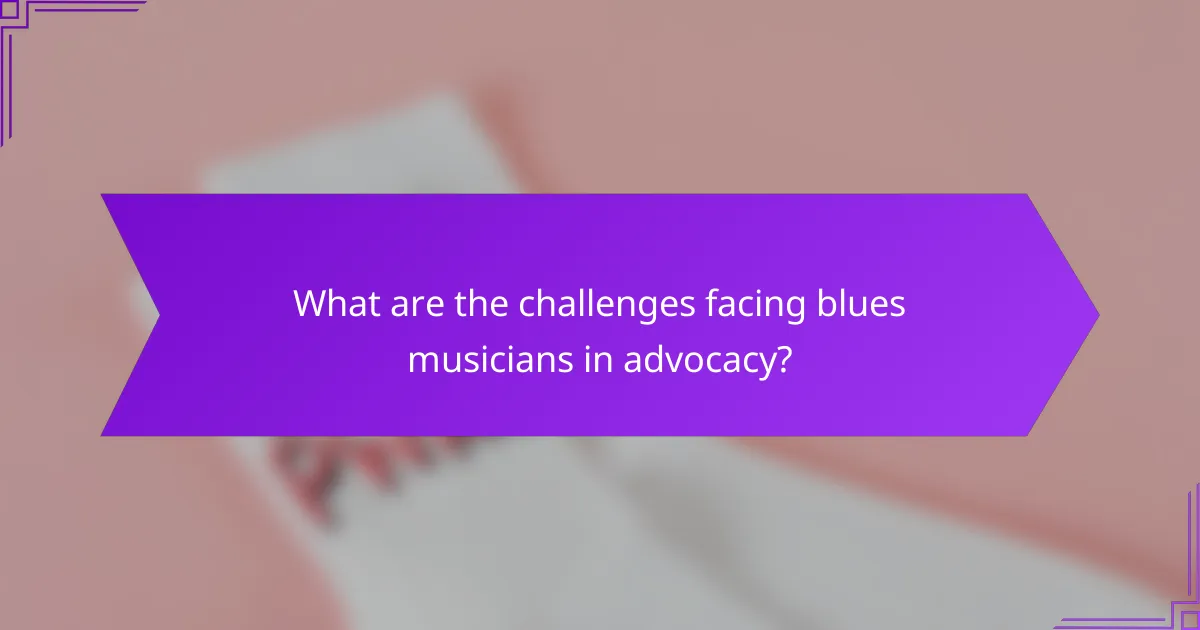
What are the challenges facing blues musicians in advocacy?
Blues musicians encounter several challenges in advocacy, including limited funding, balancing their artistic integrity with commercial demands, and navigating the complexities of social issues. These factors can hinder their ability to effectively promote awareness and drive change within their communities.
Funding and support for artists
Securing funding and support is a significant challenge for blues musicians engaged in advocacy. Many artists rely on grants, sponsorships, or crowdfunding to finance their projects, but competition for these resources can be fierce. Additionally, funding sources may prioritize mainstream genres over blues, making it harder for artists to access necessary financial backing.
Musicians can explore various avenues for support, such as local arts councils, nonprofit organizations, and community initiatives. Building relationships with these entities can lead to collaborative projects that enhance visibility and funding opportunities. Networking within the blues community can also uncover potential partnerships that provide financial assistance.
Balancing commercial success with activism
Blues musicians often face the dilemma of balancing commercial success with their commitment to activism. While mainstream appeal can lead to greater visibility and resources, it may require compromising their message or artistic expression. This tension can create a conflict between staying true to their roots and achieving broader recognition.
To navigate this balance, artists should define their core values and identify how they can integrate advocacy into their work without sacrificing authenticity. Collaborating with like-minded musicians and organizations can amplify their message while maintaining commercial viability. Setting clear goals for both artistic and advocacy efforts can help in making informed decisions that align with their mission.
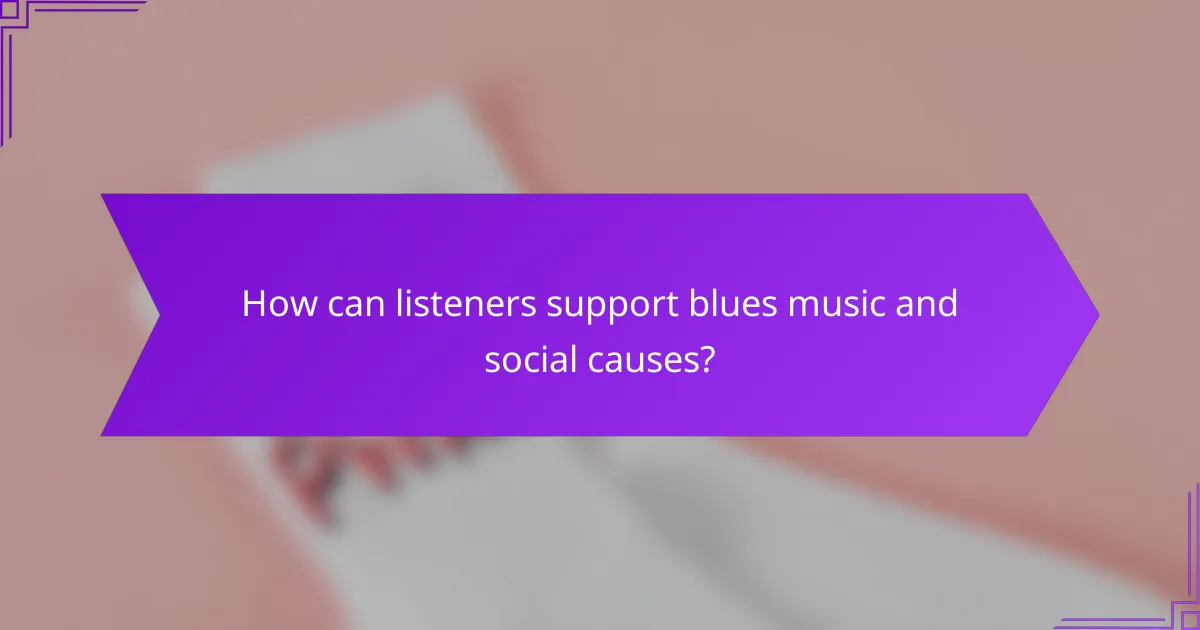
How can listeners support blues music and social causes?
Listeners can support blues music and social causes by actively engaging with local artists and participating in advocacy events. This involvement not only helps sustain the blues community but also raises awareness for important social issues.
Supporting local artists and venues
Supporting local artists and venues is crucial for the sustainability of the blues genre. Attend live performances at local clubs and festivals, as ticket sales directly benefit the musicians and venues. Consider purchasing merchandise or music directly from artists to ensure they receive a fair share of the profits.
Engaging with local blues scenes can also involve promoting events on social media or through word of mouth. Sharing information about upcoming shows or fundraising events can help increase attendance and visibility for both the artists and the causes they support.
Participating in advocacy events
Participating in advocacy events related to blues music can amplify social causes and foster community engagement. Look for events such as benefit concerts, workshops, or community gatherings that focus on social justice issues, where proceeds often go to relevant charities or initiatives.
Involvement can range from attending these events to volunteering your time or resources. Consider donating to organizations that support musicians facing hardships or those advocating for social change, as this financial support can make a significant impact.
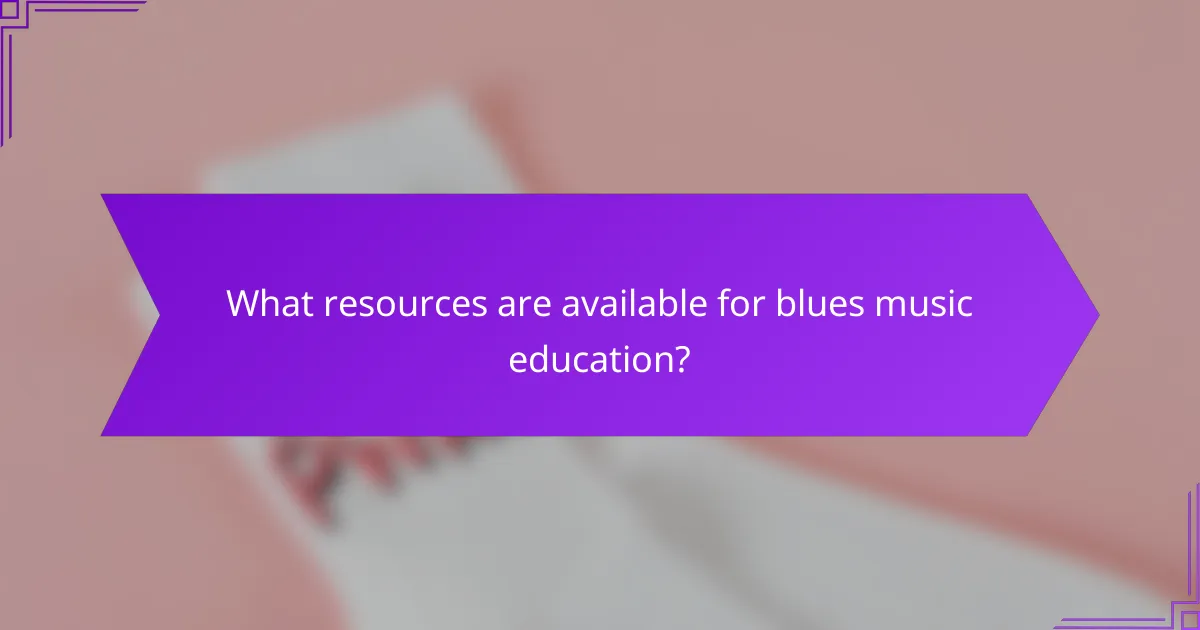
What resources are available for blues music education?
Blues music education resources include various programs, online platforms, and community initiatives that focus on teaching the history and techniques of blues music. These resources cater to different skill levels and can enhance both theoretical knowledge and practical skills in playing blues music.
Music programs focusing on blues history
Many music schools and community colleges offer specialized programs that delve into the history of blues music, exploring its origins and cultural significance. These programs often include lectures, workshops, and hands-on sessions with experienced musicians.
Additionally, organizations like the Blues Foundation provide educational resources and scholarships aimed at promoting blues music. Participating in local workshops or attending blues festivals can also provide valuable insights into the genre’s evolution and its social impact.
Online platforms for learning blues music
Numerous online platforms offer courses specifically designed for learning blues music, such as MasterClass, Coursera, and YouTube channels dedicated to music education. These platforms often feature lessons from renowned blues musicians, covering everything from basic guitar techniques to advanced improvisation skills.
When choosing an online course, consider factors like instructor reputation, course reviews, and the depth of content. Many platforms offer free trials or individual lessons, allowing learners to explore different styles and techniques before committing to a full course.
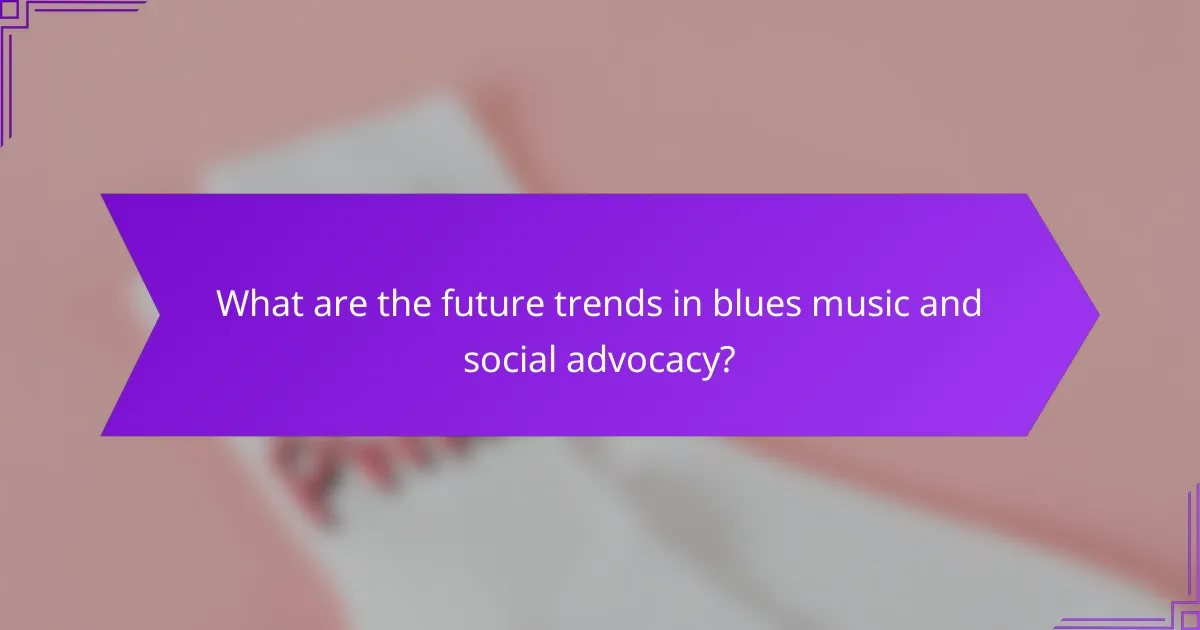
What are the future trends in blues music and social advocacy?
The future of blues music is increasingly intertwined with social advocacy, as artists leverage their platforms to address pressing social issues. This trend reflects a growing awareness among musicians and fans alike about the role of music in driving social change.
Emerging artists and their impact
New blues artists are bringing fresh perspectives and diverse backgrounds, which enhances the genre’s relevance in contemporary discussions around social issues. Many of these musicians use their lyrics and performances to highlight topics such as racial inequality, mental health, and economic hardship.
For example, artists like Gary Clark Jr. and Shemekia Copeland have gained recognition not only for their musical talent but also for their commitment to advocacy. Their work encourages audiences to engage with social justice movements, making blues a powerful vehicle for change.
Integration of technology in blues music advocacy
Technology is playing a crucial role in amplifying the voices of blues artists advocating for social issues. Social media platforms allow musicians to reach wider audiences, share their messages, and mobilize support for various causes. Streaming services also provide opportunities for independent artists to distribute their music without traditional barriers.
Moreover, virtual events and online campaigns have become effective tools for raising awareness and funds for social justice initiatives. For instance, live-streamed concerts can generate donations for charities focused on racial equality or mental health support, showcasing how technology can enhance advocacy efforts in the blues community.
